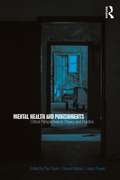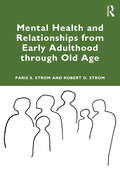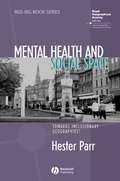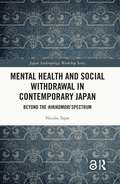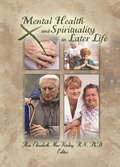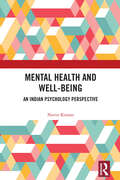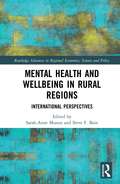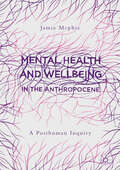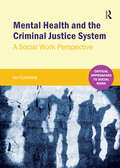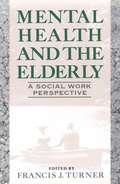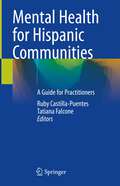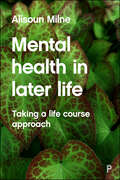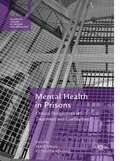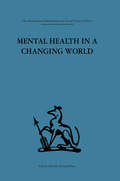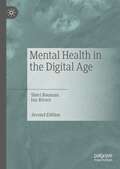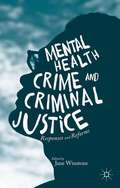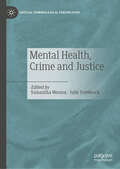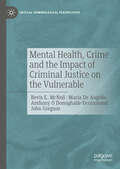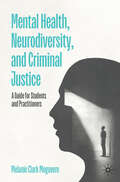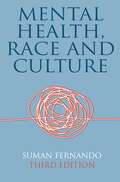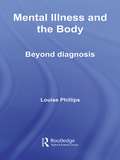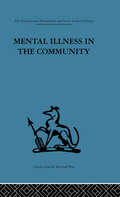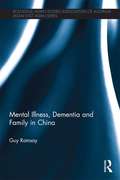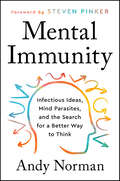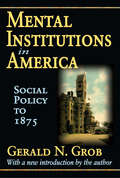- Table View
- List View
Mental Health and Punishments: Critical Perspectives in Theory and Practice
by Paul Taylor Sharon Morley Jason PowellHow might we best manage those who have offended but have mental vulnerabilities? How are risks identified, managed and minimised? What are ideological differences of care and control, punishment and therapy negotiated in practice? These questions are just some which are debated in the eleven chapters of this book. Each with their focus on a given area, authors raise the challenges, controversies, dilemmas and concerns attached to this particular context of delivering justice. Taking insights on imprisonment, community punishments and forensic services, this book provides a broad analysis of environments. But it also casts a critical light on how punishment of the mentally vulnerable sits within public attitudes and ideas, policy discourses, and the ways in which those seen to present as risky and dangerous are imagined. Written in a clear and direct style, this book serves as a valuable resource for those studying, working or researching at the intersections of healthcare and criminal justice domains. This book is essential reading for students and practitioners within the fields of criminology and criminal justice, social work, forensic psychology, forensic psychiatry, mental health nursing and probation.
Mental Health and Relationships from Early Adulthood through Old Age
by Paris S Strom Robert D. StromThis unique text encourages young adults to reflect on their prospective longevity for setting goals and making decisions, become aware of the aspirations and concerns of other generations, and consider personal direction in relation to peer group norms. The sources for learning about mental health and relationships include a blend of academic research, insights from literature, student interviews with older and younger relatives, and personal observations.Stages of adulthood including early adulthood, middle adulthood, retirement age, and old age, are described showing how people can pursue individual growth and nurture the mental health of relatives throughout life. The main themes of younger and middle-aged adults include stress, parenting, peer socialization, family conflict, career readiness, domestic abuse, intergenerational relationships, and mental health. In addition, the educational needs of older adults focus on mental health, family caregiving, grandparenting, physical and social health, problems of younger generations, retirement, loneliness and social isolation, elder abuse, death, grief, and recovery.All chapters conclude with a section about Generational Perspectives Activities, assignments with agenda for class and family discussions, problem-solving scenarios, key concepts, and criteria for self-evaluation. This will be of interest to undergraduate and graduate college students enrolled in lifespan courses offered by family studies, educational psychology, human development, counselling, social work, gerontology, nursing, and business.
Mental Health and Social Space: Towards Inclusionary Geographies? (RGS-IBG Book Series #12)
by Hester ParrThrough a series of case studies this book brings to the fore the voices, lives, and capacities of people with mental health problems as well as the difficulties they face. It effectively demonstrates the ways people with mental health problems are active in re-scripting versions of social recovery through their use of very different community spaces. Offers a 'hopeful epistemology' not typically found in mental health-related research Interrogates neo-liberal dogma that defines people with mental health problems as active social citizens wholly responsible for their own recoveries and acceptance Brings to the fore the voices of, lives, capacities and difficulties facing people with mental health problems Imaginatively differentiates rural, urban, interest and technological communities, disrupting familiar and conventional accounts of social inclusion and 'the local' Demonstrates how people with mental health problems are active in re-scripting their own social recoveries through their use and understanding of different social spaces
Mental Health and Social Withdrawal in Contemporary Japan: Beyond the Hikikomori Spectrum (Japan Anthropology Workshop Series)
by Nicolas TajanThis book examines the phenomenon of social withdrawal in Japan, which ranges from school non-attendance to extreme forms of isolation and confinement, known as hikikomori. Based on extensive original research including interview research with a range of practitioners involved in dealing with the phenomenon, the book outlines how hikikomori expresses itself, how it is treated and dealt with and how it has been perceived and regarded in Japan over time. The author, a clinical psychologist with extensive experience of practice, argues that the phenomenon although socially unacceptable is not homogenous, and can be viewed not as a mental disorder, but as an idiom of distress, a passive and effective way of resisting the many great pressures of Japanese schooling and of Japanese society more widely. The Open Access version of this book, available at http://www.taylorfrancis.com/books/e/9781351260800, has been made available under a Creative Commons Attribution-Non Commercial-No Derivatives (CCBY-NC-ND) licence.
Mental Health and Spirituality in Later Life
by Elizabeth MacKinlayExplore pastoral strategies for dealing with mental health problems! Mental health is increasingly being recognized as an important issue in later life. This valuable book will help you examine this dimension of aging in the context of pastoral, spiritual, and cultural issues. It explores the relationship between mental health, spirituality, and religion in later life, including the search for meaning, cultural issues, spiritual issues, depression, dementia, and issues of suicide in older people. The first part of Mental Health and Spirituality in Later Life focuses on theology, ethics, and cultural issues in mental health and aging. The second part addresses issues of multidisciplinary practice, including a challenging chapter written by a woman with early onset dementia (Alzheimer's) and other chapters that present perspectives on the uses and meanings of ritual and symbolism in mental health and pastoral approaches to care. Part one of Mental Health and Spirituality in Later Life deals with issues of theology, culture, and mental health in later life, focusing on: the importance of a richly textured understanding of personhood as a prerequisite for constructing a picture of late-life mental health in the context of theology the relationship between culture, spirituality, and meaning for older immigrants-and their effects on mental health the adverse effects of a mental health system that reflects only the dominant culture of a society, leaving minority cultures vulnerable to misdiagnosis and inappropriate treatments that can do more harm than good a wholistic picture of aging that moves beyond the biomedical paradigm and demonstrates the power and potential of the human spirit in adjusting to and moving beyond suffering Part two of this valuable book addresses issues of concern to practitioners in mental health and spirituality for the aging, including: disruptive behavior among nursing home residents and common practices that fail to identify its causes or address the problem how some staff/resident interactions can produce suffering for all concerned-with case study outlines that illustrate the point memory loss and its effect on spirituality, self-worth, and the faith community pastoral care for people suffering with dementia-with practical information on helping them to make use of the power of prayer and to deal with loneliness, fear, and disempowerment an insightful look at a recent major study of residents in aged care facilities in Australia that explores the link between depression and spirituality risk and protective factors associated with suicide in later life and the treatment of depression pastoral interventions for depression and dementia
Mental Health and Well-being: An Indian Psychology Perspective
by Navin KumarThe book analyses mental health, well-being, and their interdependence through Indian perspectives. It offers critical insights on mastering wellness, stress, and coping, suffering and healing, and achieving work-life balance. Describing key concepts of the Indian philosophical thought with contemporary implications, the volume focuses on explaining the how mental health and mental well-being are correlated. It examines the dynamic interplay of biological, social, psychological, ecological, cultural, religious, and spiritual factors that affect individuals in their everyday lives and act as contributing factors to our illness or wellness. The book also explores in-depth Indian traditions of spirituality and their significant contributions to mental well-being, including discussions on concepts found in Ayurveda and Yoga. This book will be of interest to students, researchers, and teachers of psychology, applied psychology, clinical and counselling psychology, and wellness. It will also be very helpful for academicians, mental health professionals, counsellors, and those working in health and wellbeing industries.
Mental Health and Wellbeing in Rural Regions: International Perspectives (Routledge Advances in Regional Economics, Science and Policy)
by Sarah-Anne Munoz Steve F. BainThis book considers how rurality interacts with the mental health and wellbeing of individuals and communities in different regional settings. Through the use of international and comparative case studies, the book offers insight into the spatiality of mental health diagnoses, experiences, services provision and services access between and within rural areas. It is the first book to specifically address rural mental health geographies from an international perspective, and will be of interest to researchers and policymakers in rural studies, regional studies, health geography and rural mental health.
Mental Health and Wellbeing in the Anthropocene: A Posthuman Inquiry
by Jamie McphieThis book makes the unorthodox claim that there is no such thing as mental health. It also deglamourises nature-based psychotherapies, deconstructs therapeutic landscapes and redefines mental health and wellbeing as an ecological process distributed in the environment – rather than a psychological manifestation trapped within the mind of a human subject. Traditional and contemporary philosophies are merged with new science of the mind as each chapter progressively examples a posthuman account of mental health as physically dispersed amongst things – emoji, photos, tattoos, graffiti, cities, mountains – in this precarious time labelled the Anthropocene. Utilising experimental walks, play scripts and creative research techniques, this book disrupts traditional notions of the subjective self, resulting in an Extended Body Hypothesis – a pathway for alternative narratives of human-environment relations to flourish more ethically. This transdisciplinary inquiry will appeal to anyone interested in non-classificatory accounts of mental health, particularly concerning areas of social and environmental equity – post-nature.
Mental Health and the Criminal Justice System: A Social Work Perspective (Critical Approaches to Mental Health)
by Ian CumminsThe Criminal Justice System is becoming a de facto provider of mental health care, according to a series of recent prison inspections and reports on policing and mental illness which have highlighted the crisis in mental health services. However, the pressures on prisons and other areas of the CJS mean that the needs of those with mental health problems are often overlooked.This book examines the experiences of people with mental health problems across all stages of the CJS and across all the points of contact – police, Courts and prisons between the CJS and people with mental health problems. Providing a clearly written, comprehensive introduction to the main themes in this field, it also has a clear critical edge highlighting the failings in the areas of penal and social policy that have resulted in increasing numbers of people with mental health problems being criminalised.Highlighting a very important social issue, Mental Health and the Criminal Justice System provides a thorough introduction to this subject for social work students and practitioners.
Mental Health and the Elderly: A Social Work Perspective
by Francis J. TurnerThe increasing proportion of elderly people in society is a great challenge to social services. This work examines the psychological disorders to which the elderly are prone, providing a comprehensive guide to diagnosis and treatment. Specialists in the field each examine a disorder from a social work perspective, integrating the biological, psychological and social dimensions of the problem. Cases histories are included in each chapter, and there is advice on how social workers can co-operate with families to provide suitable treatment. Topics covered include Alzheimer's disease, depressive disorders, anxiety atates, alcohol addiction, suicide, schizophrenia, paranoia, autism and phobias.
Mental Health for Hispanic Communities: A Guide for Practitioners
by Tatiana Falcone Ruby Castilla-PuentesThis book is the first authoritative medical text that considers the unique cultural backgrounds of Hispanic populations in a straightforward yet sensitive way, all while building a framework for practical psychiatric assessment and treatment plans. As the only book to consider the unique challenges facing Hispanic mental healthcare, this book is at the forefront of a serious issue that has gone unchallenged for too long. The text is written by two expert psychiatrists with an established history of leadership in this space. Chapters carefully and meticulously establish the issues of access to care in Latinx communities before addressing the unique needs of these patients in the context of common psychiatric disorders. Each disorder includes clinical cases for a reader-friendly approach to the challenges that develop effective assessment and treatment plans. Mental Health for Hispanic Communities is a concise yet comprehensive reference invaluable to all clinicians, students, and other medical professionals seeking to work with this population effectively.
Mental Health in Later Life: Taking a Life Course Approach (Ageing and the Lifecourse series)
by Alisoun MilneFocusing on mental health rather than mental illness, this book adopts a lifecourse approach to understanding mental health and wellbeing in later life. Well-respected author and scholar Alisoun Milne explores the influences of lifecourse experiences, structural inequalities, socio-political context, history, gender and age related factors and engages with new ways of thinking about preventing mental ill health and promoting mental health in later life. Drawing together material from a number of different fields, the book analyses the meaning and determinants of mental health among older populations and offers a critical review of the lifecourse, ageing and mental health discourse for students, professionals, policy makers and researchers.
Mental Health in Prisons: Critical Perspectives on Treatment and Confinement (Palgrave Studies in Prisons and Penology)
by Alice Mills Kathleen KendallThis book examines how the prison environment, architecture and culture can affect mental health as well as determine both the type and delivery of mental health services. It also discusses how non-medical practices, such as peer support and prison education programs, offer the possibility of transformative practice and support. By drawing on international contributions, it furthermore demonstrates how mental health in prisons is affected by wider socio-economic and cultural factors, and how in recent years neo-liberalism has abandoned, criminalised and contained large numbers of the world’s most marginalised and vulnerable populations. Overall, this collection challenges the dominant narrative of individualism by focusing instead on the relationship between structural inequalities, suffering, survival and punishment. Chapter 2 of this book is available open access under a CC BY 4.0 license via link.springer.com.
Mental Health in a Changing World: Volume one of a report on an international and interprofessional study group convened by the World Federation for Mental Health
by Kenneth Soddy Robert H Ahrenfeldt Mary C KidsonTavistock Press was established as a co-operative venture between the Tavistock Institute and Routledge & Kegan Paul (RKP) in the 1950s to produce a series of major contributions across the social sciences. This volume is part of a 2001 reissue of a selection of those important works which have since gone out of print, or are difficult to locate. Published by Routledge, 112 volumes in total are being brought together under the name The International Behavioural and Social Sciences Library: Classics from the Tavistock Press. Reproduced here in facsimile, this volume was originally published in 1965 and is available individually. The collection is also available in a number of themed mini-sets of between 5 and 13 volumes, or as a complete collection.
Mental Health in the Digital Age
by Sheri Bauman Ian RiversThis second edition of this highly impactful book examines the intersection of mental health and digital technology to make informed decisions about the new options provided by digital technology. It highlights the rise in online therapy and social media and examines the ethical dilemmas involved in online research to suggest that the benefits created far outweigh the possible risks. This expanded and updated second edition, includes practical suggestions for clinicians and public, builds upon the first by updating readers on recent developments in technology and research in this area since 2015. It explores ways in which governments and practitioners responded to the mental health crisis caused by the Covid-19 pandemic, and looks at the challenges as well as the benefits of our increasing interaction online.
Mental Health, Crime and Criminal Justice: Responses and Reforms
by Jane Winstone<p>It has long been known that the pathway through the criminal justice system for those with mental health needs is fraught with difficulty. This interdisciplinary collection explores key issues in mental health, crime and criminal justice, including: offenders' rights; intervention designs; desistance; health-informed approaches to offending and the medical needs of offenders; psychological jurisprudence, and; collaborative and multi-agency practice. <p>This volume draws on the knowledge of professionals and academics working in this field internationally, as well as the experience of service users. It offers a solution-focused response to these issues, and promotes both equality and quality of experience for service users. It will be essential reading for practitioners, scholars and students with an interest in forensic mental health and criminal justice. </p>
Mental Health, Crime and Justice (Critical Criminological Perspectives)
by Samantha Weston Julie TrebilcockMental Health, Crime and Justice brings together original and state of the art contributions from theoretical, empirical, and policy-related scholarship concerned with the ways people with mental health illnesses are understood, ‘managed’, ‘controlled’ and responded to. Drawing on critical scholarship from a variety of disciplines, the collection pays careful attention to the controversial relationship between mental health and crime, as well as key issues relating to justice and social harm. It presents a synthesis of discipline-specific approaches, from law, psychiatry, sociology, and criminology, but will also bridge together developments in both theory and practice. The book explores the relationship between mental health and crime by deconstructing and analysing two important facets of the justice system: (1) the various ways in which people with mental disorder navigate and are navigated through the criminal justice (and forensic mental health) system(s); and (2) how so called ‘problematised populations’ are governed, with a particular emphasis on mental health as an unfolding dimension of social harm. Unique to this volume, well-rehearsed debates are cross-examined with contemporary critiques about social harm and justice. By considering the multifaceted dimensions of violence to include ‘gendered’, ‘structural’, and ‘systemic’, this book provides a nuanced insight that exposes the controversial relationship that is said to exist between mental health and crime. The collection seeks to highlight the harm and injustice that people with mental health disorders are subject to when interacting with the criminal justice system.
Mental Health, Crime and the Impact of Criminal Justice on the Vulnerable (Critical Criminological Perspectives)
by John Gregson Bevis E. McNeil Maria De Angelis Anthony Ó Donnghaile-DrummondThis book addresses a variety of key issues surrounding mental health and the criminalization of certain individuals and groups by the Criminal Justice System and the impact this can have on their mental health. It challenges the assumption that people with mental health problems are in some way a risk or danger to society (and themselves) and therefore have a greater propensity for committing crimes, when in reality they are more likely to become the victims of crime. It argues that the misguided correlations drawn between mental health and crime, as perpetuated by the media, policy makers, clinicians, agents of the criminal justice system, and ultimately the public, lead to the criminalization of the vulnerable. Furthermore, the criminalization, stigmatization, stereotyping, labelling and discrimination endured by people with mental health problems has a devastating effect on their mental health and well-being and has negative consequences for society as a whole. Each chapter focuses on a specific area relating to mental health, identifying key themes and issues, as well as offering recommendations for improvements with regards to the treatment and support for people with mental health problems. In addition, the treatment of offenders with mental health problems who engage with the criminal justice system and its services, such as the police, prison and probation services, is critically evaluated.
Mental Health, Neurodiversity, and Criminal Justice: A Guide for Students and Practitioners
by Melanie Clark MogaveroThis book is a critical and thorough examination of the relationship between the criminal justice and mental health systems. The chapters cover a wide range of populations, focusing on those with neurodevelopmental disabilities, specifically autism and intellectual disability, mental illnesses such as post-traumatic stress disorder and schizophrenia, substance use disorders, and juveniles. This book covers the entire criminal justice process from initial contact, police questioning, the court system, community and custodial correctional systems, and the forensic mental health system. Specific topics addressed include community interactions and crisis intervention, comprehension of Miranda warnings, competency to stand trial, eyewitness identification procedures, admissibility of expert testimony, defenses of legal responsibility, community corrections, and ethical concerns with incarceration and eligibility for capital punishment. This book also covers the history and development of the criminal justice, juvenile justice, and mental health systems to contextualize modern-day policies and practices. With student-friendly features, current terminology, inclusive language, and key findings for criminal justice practitioners, this book serves as both a textbook and extensive reference for courses and for those seeking to learn more about these diverse populations and to have a positive impact. The content has international implications.
Mental Health, Race and Culture
by Suman FernandoThis powerful text offers a unique analysis of the impact of race and culture on contemporary issues in mental health. Drawing on extensive international experience, Fernando challenges the traditional ideas that inform practice in clinical psychology and psychiatry in order to promote new and alternative ways of thinking. Covering both theoretical perspectives and practical implications, this insightful text discusses perceptions of ethnicity and identity, compares practices around the world and looks at racism in mental health services. <P><P> This fully revised, expanded and updated edition of a seminal text offers students and practitioners alike a comprehensive and reliable study of both western and non-western psychiatry and mental health practices.
Mental Illness and the Body: Beyond Diagnosis
by Louise PhillipsUsing real life case studies of people experiencing mental illness, this book identifies how bodily presentation of patients may reflect certain aspects of their ‘lived experience’. With reference to a range of theoretical perspectives including philosophy, psychoanalysis, feminism and sociology, Mental Illness and the Body explores the ways in which understanding ‘lived experience’ may usefully be applied to mental health practice. Key features include: an overview of the history of British psychiatry including treatments an analysis of feminism and the way its insights have been applied to understanding women's mental health and illness in-depth interviews with four patients diagnosed with mental illness an outline of Freudian and post-Freudian perspectives on the body and their relevance to current mental health practice. Mental Illness and the Body is essential reading for mental health practitioners, allied professionals and anyone with an interest in the body and mental illness.
Mental Illness in the Community: The pathway to psychiatric care (Social Science Paperbacks Ser.)
by David Goldberg Peter HuxleyTavistock Press was established as a co-operative venture between the Tavistock Institute and Routledge & Kegan Paul (RKP) in the 1950s to produce a series of major contributions across the social sciences. This volume is part of a 2001 reissue of a selection of those important works which have since gone out of print, or are difficult to locate. Published by Routledge, 112 volumes in total are being brought together under the name The International Behavioural and Social Sciences Library: Classics from the Tavistock Press. Reproduced here in facsimile, this volume was originally published in 1980 and is available individually. The collection is also available in a number of themed mini-sets of between 5 and 13 volumes, or as a complete collection.
Mental Illness, Dementia and Family in China (Routledge/Asian Studies Association of Australia (ASAA) East Asian Series)
by Guy RamsayWith rapid economic progress and increasing life expectancy in East Asian societies, more attention is being paid by their governments, the media and the academy to mental illness and dementia. While clinical research on mental illness and dementia in Chinese societies acknowledges the importance of culture in shaping people’s experiences of these illnesses, how Chinese culture shapes people’s understandings of and responses to mental illness and dementia has yet to be interrogated to any depth. Mental Illness, Dementia and Family in China breaks new ground in exploring how Chinese culture, namely, the understandings, norms, values and scripts that people acquire through being members of a Chinese community, shapes contemporary stories of mental illness, dementia and family care-giving. This book is innovative in examining and comparing stories which have been drawn from both real life (‘life stories’), as well as from film and television productions (‘filmic stories’). These two forms effectively complement each other, with life stories generally presenting an ‘insider’s’ account and filmic stories generally presenting an ‘outsider’s’ account. What remains unvoiced in one kind of story may be voiced in the other kind. Drawing on the perspectives and analytic approaches of narrative analysis and cultural studies, Guy Ramsay uncovers culturally-shaped continuities and departures in representations of time, identity and cause of illness as well as in the language employed in contemporary stories of mental illness, dementia and family care-giving in China. This book will be invaluable to students and scholars working on Chinese cultural studies and Asian social policy, as well as those interested in psychiatry, mental health and disability studies more broadly.
Mental Immunity: Infectious Ideas, Mind-Parasites, and the Search for a Better Way to Think
by Andy Norman“Mental Immunity is the perfect vaccine for the mind-viruses infecting our culture: alternative facts, fake news, and conspiracy thinking, to name a few.” —Michael Shermer, publisher of Skeptic magazine and author of The Believing BrainAstonishingly irrational ideas are spreading. Covid denial persists in the face of overwhelming evidence. Anti-vaxxers compromise public health. Conspiracy thinking hijacks minds and incites mob violence. Toxic partisanship is cleaving nations, and climate denial has pushed our planet to the brink. Meanwhile, American Nazis march openly in the streets, and Flat Earth theory is back. What the heck is going on? And what can we do about it? In Mental Immunity, Andy Norman shows that these phenomena share a root cause. We live in a time when the so-called “right to your opinion” is thought to trump our responsibilities. The resulting ethos effectively compromises mental immune systems, allowing “mind parasites” to overrun them. Conspiracy theories, evidence-defying ideologies, garden-variety bad ideas: these are all species of mind parasite, and each of them employs clever strategies to circumvent mental immune systems. In fact, some of them compromise cultural immune systems—the things societies do to prevent bad ideas from spreading. Norman shows why all of this is more than mere analogy: minds and cultures really do have immune systems, and they really can break down. Fortunately, they can also be built up: strengthened against ideological corruption. He calls for a rigorous science of mental immune health—what he calls “cognitive immunology”—and explains how it could revolutionize our capacity for critical thinking.A practical guide to spotting and removing bad ideas, Mental Immunity is a stirring call to transcend our petty tribalisms, and a serious bid to bring humanity to its senses.
Mental Institutions in America: Social Policy to 1875
by Robert GolembiewskiMental Institutions in America: Social Policy to 1875 examines how American society responded to complex problems arising out of mental illness in the nineteenth century. All societies have had to confront sickness, disease, and dependency, and have developed their own ways of dealing with these phenomena. The mental hospital became the characteristic institution charged with the responsibility of providing care and treatment for individuals seemingly incapable of caring for themselves during protracted periods of incapacitation.The services rendered by the hospital were of benefit not merely to the afflicted individual but to the community. Such an institution embodied a series of moral imperatives by providing humane and scientific treatment of disabled individuals, many of whose families were unable to care for them at home or to pay the high costs of private institutional care. Yet the mental hospital has always been more than simply an institution that offered care and treatment for the sick and disabled. Its structure and functions have usually been linked with a variety of external economic, political, social, and intellectual forces, if only because the way in which a society handled problems of disease and dependency was partly governed by its social structure and values.The definition of disease, the criteria for institutionalization, the financial and administrative structures governing hospitals, the nature of the decision-making process, differential care and treatment of various socio-economic groups were issues that transcended strictly medical and scientific considerations. Mental Institutions in America attempts to interpret the mental hospital as a social as well as a medical institution and to illuminate the evolution of policy toward dependent groups such as the mentally ill. This classic text brilliantly studies the past in depth and on its own terms.
